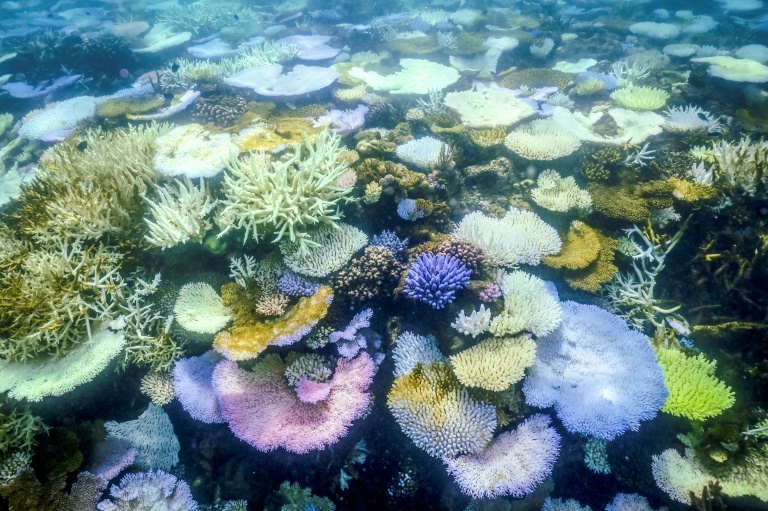Science
Red Sea Corals Show Resilience Amid Climate Change Threats

Scientists from Ohio State University have discovered that corals in the Red Sea can withstand warming ocean temperatures, yet long-term exposure to heat stress leads to significant growth reductions and weakened health. This research adds to the mounting evidence of climate change’s detrimental effects on marine ecosystems.
The study focused on a species known as Stylophora pistillata, commonly referred to as hood coral or smooth cauliflower coral, which is prevalent in the Indo-Pacific region. Researchers investigated the impacts of elevated ocean temperatures over a six-month period and found that while these corals can survive in conditions simulating future warming trends, they do not flourish.
Under controlled conditions, corals exposed to temperatures of 27.5 degrees Celsius and 30 degrees Celsius—temperatures anticipated for tropical oceans by 2050 and 2100—displayed notable changes in growth and energy levels. Corals in waters at 27.5 degrees Celsius were found to be 30% smaller than those in the control group, while those in 30 degrees Celsius waters were approximately 70% smaller.
Lead researcher Ann Marie Hulver emphasized the broader implications of these findings. She stated, “In theory, if corals in the wild at these temperatures are smaller, reefs might not be as diverse and may not be able to support as much marine life. This could have adverse effects on people that depend on the reef for tourism, fishing, or food.”
The research results indicate that even the most thermally resilient coral species might struggle to cope with the ongoing consequences of rising sea temperatures. The scientists provided a detailed forecast of how coral reefs may function in the next half-century. With ocean temperatures projected to rise by 3 degrees Celsius by 2100, predicting how coral reefs will adapt to these changes remains a complex challenge.
Understanding the alterations in coral biology due to warming waters is crucial for informing long-term conservation strategies. The findings were published in the journal Science of the Total Environment under the title “Thermally resistant coral Stylophora pistillata survives but does not thrive under chronic elevated baseline temperature.”
As the world grapples with the realities of climate change, this research not only sheds light on the vulnerability of marine ecosystems but also highlights the interconnectedness of environmental health and human livelihoods, particularly for communities reliant on coral reefs.
-

 Education2 months ago
Education2 months agoBrandon University’s Failed $5 Million Project Sparks Oversight Review
-

 Lifestyle3 months ago
Lifestyle3 months agoWinnipeg Celebrates Culinary Creativity During Le Burger Week 2025
-

 Science3 months ago
Science3 months agoMicrosoft Confirms U.S. Law Overrules Canadian Data Sovereignty
-

 Health3 months ago
Health3 months agoMontreal’s Groupe Marcelle Leads Canadian Cosmetic Industry Growth
-

 Science3 months ago
Science3 months agoTech Innovator Amandipp Singh Transforms Hiring for Disabled
-

 Technology3 months ago
Technology3 months agoDragon Ball: Sparking! Zero Launching on Switch and Switch 2 This November
-

 Education3 months ago
Education3 months agoRed River College Launches New Programs to Address Industry Needs
-

 Technology3 months ago
Technology3 months agoGoogle Pixel 10 Pro Fold Specs Unveiled Ahead of Launch
-

 Technology1 month ago
Technology1 month agoDiscord Faces Serious Security Breach Affecting Millions
-

 Business2 months ago
Business2 months agoRocket Lab Reports Strong Q2 2025 Revenue Growth and Future Plans
-

 Science3 months ago
Science3 months agoChina’s Wukong Spacesuit Sets New Standard for AI in Space
-

 Education3 months ago
Education3 months agoAlberta Teachers’ Strike: Potential Impacts on Students and Families
-

 Technology3 months ago
Technology3 months agoWorld of Warcraft Players Buzz Over 19-Quest Bee Challenge
-

 Business3 months ago
Business3 months agoNew Estimates Reveal ChatGPT-5 Energy Use Could Soar
-

 Business3 months ago
Business3 months agoDawson City Residents Rally Around Buy Canadian Movement
-

 Education3 months ago
Education3 months agoNew SĆIȺNEW̱ SṮEȽIṮḴEȽ Elementary Opens in Langford for 2025/2026 Year
-

 Technology1 month ago
Technology1 month agoHuawei MatePad 12X Redefines Tablet Experience for Professionals
-

 Technology3 months ago
Technology3 months agoFuture Entertainment Launches DDoD with Gameplay Trailer Showcase
-

 Business3 months ago
Business3 months agoBNA Brewing to Open New Bowling Alley in Downtown Penticton
-

 Technology3 months ago
Technology3 months agoInnovative 140W GaN Travel Adapter Combines Power and Convenience
-

 Technology3 months ago
Technology3 months agoGlobal Launch of Ragnarok M: Classic Set for September 3, 2025
-

 Science3 months ago
Science3 months agoXi Labs Innovates with New AI Operating System Set for 2025 Launch
-

 Technology3 months ago
Technology3 months agoNew IDR01 Smart Ring Offers Advanced Sports Tracking for $169
-

 Technology3 months ago
Technology3 months agoDiscover the Relaxing Charm of Tiny Bookshop: A Cozy Gaming Escape










